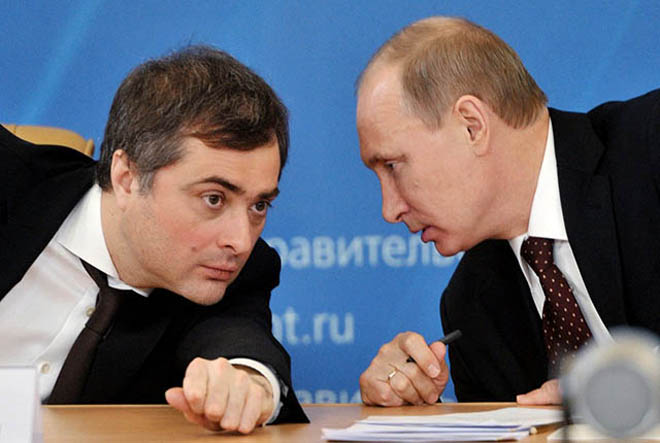
Yesterday, the collective of Ukrainian “hacktivists” called Cyber Hunta released the second batch of emails leaked from the account of Vladislav Surkov, Putin’s close adviser and emissary for the Ukraine crisis. One more hit in the cyber war with Russia.
Over a gigabyte of email – but hackers say they have something like a terabyte of files in total – were stolen from the government account prm_surkova@gov.ru, used by two assistants to Vladislav Surkov, Maria Vinogradovna and Evgenia Kudryavtseva. The first batch was released in late October. Among tons of routinely communications, some interesting information emerges about the relations between the Kremlin and Donbass separatistsand the attempts to influence Ukrainian politics through the Opposition Block, heir to Yanukovych’s Party of Regions.
The authenticity of the emails has been questioned by Putin’s spokesman, Dmitri Peskov, who said Surkov “does not use email”, which was confirmed by the secret services of Ukraine, the SBU. Neither, however, can be taken as reliable sources, among other reasons because Cyber Hunta is not linked in any way to the intelligence services. Independent analysts of the Digital Forensic Research Lab of the Atlantic Council have reviewed the metadata of many (not all) of the emails and matched the data with those available from open sources, concluding that there is no reason to question the authenticity of the whole leak. In addition, some of the senders have confirmed that the leaked messages are theirs. However, another group of emails from a Yandex account, which showed an attempt to destabilize Ukraine by fomenting a separatist movement in Transcarpathia, has proved to be a fake.
The plot for a popular uprising
According to the documents attached to some of the leaked emails, Surkov is at the center of a plot to foment a popular uprising in eastern Ukraine, chooses the separatist leaders who then will be “elected”, and sent a draft law on Donbass directly to the Ukrainian Rada, through MPs of the Opposition Block.
Surkov likes to present himself as “the author of the new Russian system“. Many believe he’s the real ideologue of Putinism. Since 2013 he has been the president’s personal adviser and Kremlin’s plenipotentiary for Ukraine. He’s the one who negotiates the peace agreements in Minsk, and he’s the one who meets the US envoy for European Affairs, Victoria Nuland, on the Donbass issue.
No wonder pro-Russians and separatists in Ukraine turn to him. Between April and June 2015, Mikhail Margelov, a member of the high chamber of the Russian parliament, sent Surkov some documents about a plot for a popular uprising in Kharkiv. The idea is to organize a series of demonstrations against the government, “30 to 50 people. Two placards, ‘Poroshenko Resign’ and ‘Poroshenko dick-head’” (“huilo”, more exactly, in response to the “Putin huilo” that has resonated in the Ukrainian cities since the outbreak of the war), support the pro-Russian organizations in the city and demonstrate the changes in public opinion on Russia. But already in mid-June, the project seemed to be shipwrecked: “Warnings like ‘Grad missiles are aimed at Kharkiv’, ‘Praviy Sektor are planning a bloody provocation’ and so on are not bringing about the desired reaction”, Margelov writes. There was no massive uprising in Kharkiv.
Choosing the “elected” leaders of DNR
In November 2014, Surkov received from a certain Mikhail Petrovich a draft law to make the Donbass a Free economic zone. The bill had to be brought to the Rada, the Ukrainian parliament, through the deputies of the Opposition Block, the old cronies of the Yanukovych clan. It does not appear, however, that the law was ever submitted.
In May 2014 Surkov received another email from an account belonging to the Marshall investment fund, property of the Russian businessman and ultranationalist activist Konstantin Malofeev, also considered one of the main sponsors of the separatists. The attached document contains the list of candidates for election in the “republic” of Donetsk, with annotations of type “verified by us” and “strongly recommended” next to some names, including that of the current “prime minister” Aleksandr Zakharchenko. Three days later the new government was presented.
Another interesting element is given by an email dated 16 June 2014, sent to Surkov directly by the then “president” of the People’s Council of the DNR, Denis Pushilin, with the expenses bill of the press office, the Ministry of Information and the press centre. Journalists, editors and photographers are on the Kremlin’s payroll. The same people and offices were target ofanother email leak that revealed the operation of separatist propaganda a few weeks ago. Now we know that the money comes directly from Moscow with Surkov’s approval.
@daniloeliatweet
Yesterday, the collective of Ukrainian “hacktivists” called Cyber Hunta released the second batch of emails leaked from the account of Vladislav Surkov, Putin’s close adviser and emissary for the Ukraine crisis. One more hit in the cyber war with Russia.






